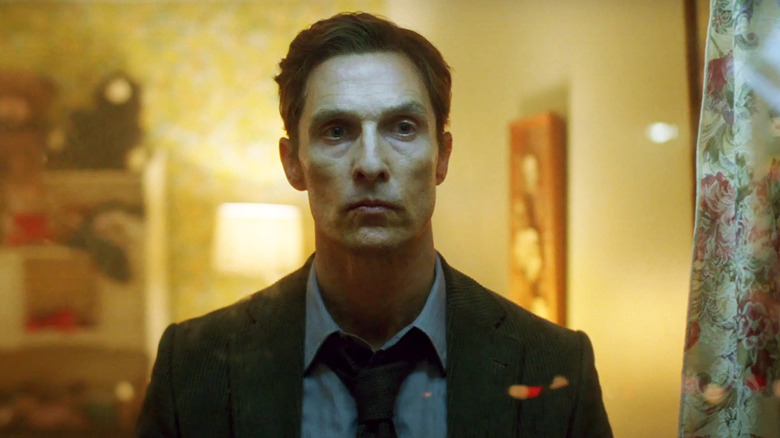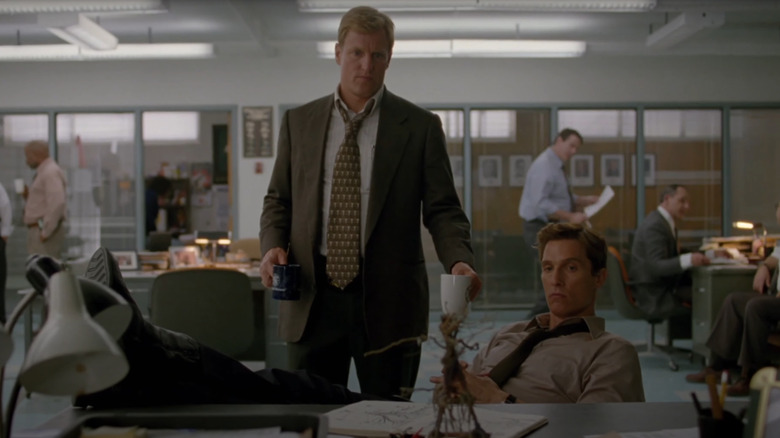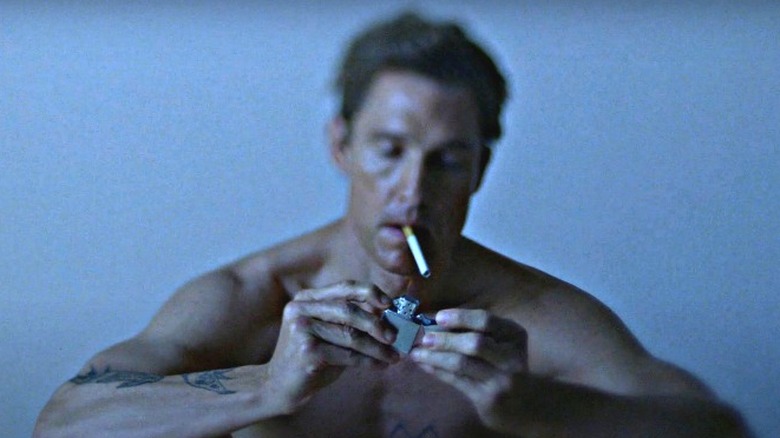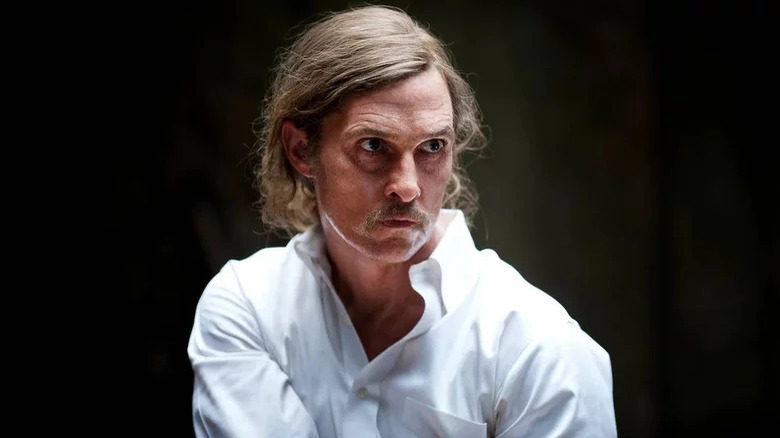True Detective's Matthew McConaughey Wrote A 450-Page Character Analysis
Most fans of "True Detective" will agree that season 1 was a high point for Nic Pizzolatto's crime drama. The fastidious show creator and writer maintained tight control over the series for its first three seasons, which often caused problems for the directors — especially Cary Fukunaga. For "True Detective" season 4, Pizzolatto handed the reins to "Tigers Are Not Afraid" director Issa López, who can hopefully return the series to the standard established by its brilliant inaugural season.
That's going to be a tough feat. Season 1 of "True Detective" had so much going for it, it's hard to see how it could be matched, let alone bested. The eight episodes were helped tremendously by two career-best performances from leading men Woody Harrelson as Detective Marty Hart, and Matthew McConaughey as Detective Rust Cohle. Alongside some of the most layered yet consistently compelling storytelling seen in the age of the prestige drama, these performances helped elevate the show beyond your typical crime procedural, culminating in a thoughtful exploration of weighty philosophical topics and deep moral questions.
When it came to the brilliant-yet-troubled Rust, McConaughey faced a big challenge, not only in the sense that the man was a complex character but due to the almost two-decade-spanning scope of the show itself. The first season of "True Detective" takes place over the course of 17 years, with Rust transforming dramatically during that time span from a devoted detective to a burnout alcoholic seemingly chasing conspiracy theories. Plagued by alcoholism in the wake of his daughter's death and his resulting divorce, and burdened with a curious and brilliant mind, Rust presented an enticing challenge for McConaughey, who took some unorthodox steps to prepare.
Breaking down Rust
"True Detective" season 1 had so much working in its favor, and the lead performances were a big part of its success. Woody Harrelson and Matthew McConaughey, who'll soon be reuniting for an Apple TV+ comedy series in which they play themselves, had an undeniable chemistry despite their characters' seemingly opposed personalities. Marty Hart was an everyman cop and family man, with an unfortunate penchant for cheating on his wife. Rust Cohle on the other hand, was a much more complex character, as McConaughey discovered during his prep for the show.
In a 2016 interview on "The Rich Eisen Show," the actor revealed how he'd actually been approached to play Marty, but asked to play Rust after reading the script, claiming the character was "arresting [him] every time [he] read something that comes out of his mouth." Once he'd secured the role, McConaughey took a meticulous approach to his preparation, particularly in relation to the scenes in the interrogation room, which within the "True Detective" timeline, occur much later on. According to the actor, he broke down the 28 pages of script for those scenes into "seven different bubbles," which helped him "understand the dialogue" before further reducing the writing into smaller "pods." According to the Oscar-winner, this helped him comprehend the long monologues Nic Pizzolatto had written for his character. And his meticulous approach didn't stop there.
The actor told Rolling Stone in 2014 that he made a "450-page graph of where Cohle was and where he was coming from." Unlike the diary Heath Ledger kept while preparing for his role as the Joker in "The Dark Knight," McConaughey's document was surprisingly organized, with the actor breaking down Rust's character development into four eras.
The stages of Rust Cohle
Matthew McConaughey explained to Rolling Stone how the "four stages of Rust Cohle" began with "1995 Cohle" — the earliest version of the character in the show. This era comes after Rust has spent years as an undercover agent known as "Crash," and sees the homicide detective team up with Woody Harrelson's Marty as they both work the case that eventually bonds them for life. As McConaughey saw it, at this point his character is "trying to walk the line," and needs the regimen of a homicide detective career. "He needs the case to actually survive," he explained. "One, because he's great at it. And two, because it's going to keep him from killing himself."
But, as anyone who remembers that incredible six-minute oner from episode 4 will remember, "1995 Rust" is soon forced to return to his Crash persona to infiltrate a biker gang tied to the central mystery. For McConaughey, this Rust was a "deep, narco wild-ass," who provides an excuse to "go over the edge" — something he's clearly holding himself back from prior to resuming his undercover persona. McConaughey described this version of Rust as someone who "knows he may die sooner living this life, but there's a freedom and peace in that knowledge for him."
Then, there's a less memorable but just as important iteration of Rust that comes in the form of "2002 Cohle." This Rust had found a girlfriend and, according to McConaughey, "relaxed into his way in the world," even while he still maintains a drive to solve the ongoing case he and Marty seemingly closed years before. But as the actor himself shrewdly noted, this version of Rust is only important insofar as it proves he's not cut out for the comfort of domestic life.
The final stage
That left one more stage of Rust Cohle to map out. This version is easily the most memed, thanks to his, "Time is a flat circle," line. "This guy lived longer than he hoped," the actor explained. "Fallen prey to his own beliefs. More cynical, angrier, he's had to endure the existence of this s***storm called life."
What's interesting about this Rust is that while he may appear to be the most cynical, he actually delivers one of the most uplifting lines of the whole season. Towards the end as he and Marty discuss "light versus dark" while pondering the star-filled night sky, Rust remarks, "Well, once there was only dark. You ask me, the light's winning." Matthew McConaughey seemingly recognized this vestige of optimism within Rust. As he told Rolling Stone, the "2012 Rust" is someone who "will not accept defeat," and who's "not going become a madman, he's not going to kill himself" — a genuine example of his character development considering he started as a cop who needed the structure of detective work to keep him from doing just that.
That final line delivery, where Rust uses the night sky as a metaphor for the light winning over darkness, not only tops off one of the best episodes of "True Detective," it's a tastefully positive way to end a run of eight episodes that, up until that point, had been concerned with some decidedly grim subject matter. McConaughey seemingly recognized the fight left in his character, even after enduring all that darkness and making it out to the other side, and the performance was all the better for it. While it may seem a little over the top to create a 450-page journal and get as analytical as McConaughey did, you can't argue with the results.



